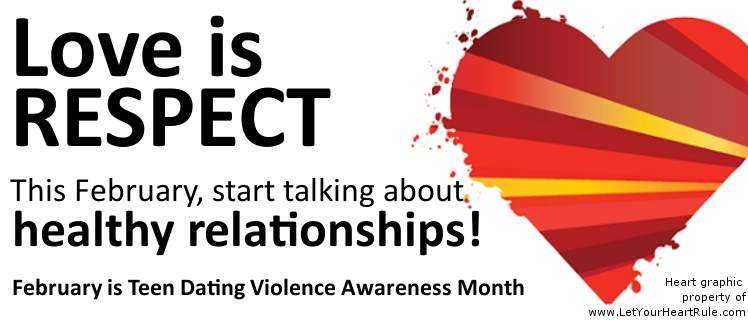February is Teen Dating Violence Awareness Month
February is nationally recognized Teen Dating Violence Awareness Month. Dating violence, sometimes called dating abuse, domestic violence, or intimate partner violence, all refer to the same thing—unhealthy relationships. These relationships involve one partner having power and control over the other.
Studies show that 1 in 3 teens admits to experiencing abuse in a dating relationship. Additionally, data tells us that girls and young women between the ages of 16 and 24 experience the highest rates of dating violence. Since teens are new to dating, they often fail to see the ‘warning signs.’ This is why education and support from an adult is critical.
The overwhelming data begs the question – do you talk to your kids about dating? Regardless of what your children tell you, data says that about 72% of eighth and ninth graders are “dating”. Either way, talking to your children about dating at an early age prevents abuse before it can happen. Take some time to discuss healthy relationships versus unhealthy ones. Make sure they understand respect in a relationship and mirror good behaviors in your own relationships.
Now is the time to talk to your teen. If you need help getting the conversation started, take a look at this excellent guide for parents. Also, for facts and information all month, follow the District Attorney’s Office on Twitter @BristolDA and on Facebook.
Plus… check our our brochure on how technology can be used to abuse.
Teens, Technology, and Dating Violence
Types of Abuse
How abuse happens – Teens may not think they are being abused because they have never been hit, but abuse takes many forms. In fact, the most common type of dating abuse among teens involves verbal and emotional abuse. Physical abuse and sexual abuse also occur. Regardless of which form of abuse is used, none of these are okay.
Emotional and verbal abuse:
Spreading rumors, putting you down and insulting you, making you feel crazy, isolating you, and trying to control who you see and what you do.
Intimidation and threats:
Threatening to spread rumors or to use technology to hurt you, making you afraid by looks and gestures, scaring you by throwing things, making threats to hurt you, your family, friends, or threatening to commit suicide.
Denying blame and making up:
Turning everything into your fault, making excuses for their behaviors, and acting like it’s no big deal. They may apologize and make promises that it will never happen again.
Physical abuse:
Hitting, pushing, and shoving you, acting or lashing out erratically, making you feel afraid, or restraining you so you can’t walk away.
Sexual abuse:
Touching you without consent, making sexual comments, convincing or forcing you to do something you don’t want to do, using drugs/alcohol to take advantage.
Never remain silent
When a person is abused, they often do not tell anyone. They may be confused or feel alone. They might also feel afraid to tell the truth. However dating violence is something many young persons face. Not speaking out can lead to continued abuse, low-self esteem, depression, and even thoughts of suicide. It can also lead to a life-long pattern of unhealthy relationships. It is important that victims report the abuse or at least seek help for their own safety and wellbeing. This does not always mean that a partner will get into trouble, but it does allow victims to escape.
To report abuse or seek help:
First, tell someone. Tell a parent, teacher, or trusted adult. Visit your school guidance counselor for advice and resources for help.
You may also call a hotline to ask questions, or call a local service agency. All agencies help teens experiencing abuse and all services are FREE.
Local Hotline
(508) 99WOMEN (999-6636)
Statewide Hotline
SAFELINK (977) 785-2020
TTY Hotline (877) 521-2601
National Hotline
1-800-799-SAFE (7233)
The Women’s Center, New Bedford
(508) 996-3343
STARR Stanley Street Women’s Center, Fall River
(508) 675-0087
New Hope, Attleboro/Taunton
1-800-323-HOPE (4673)
A Safe Place, Nantucket
(508) 228-2111
Brockton Family and Community Resources, Brockton
1-800-281-6498
Cape Cod Center for Women, Cape Cod
1-800-281-6498
Independence House, Cape Cod
(800) 439-6507
South Shore Women’s Center, Plymouth
(781) 582-0078






